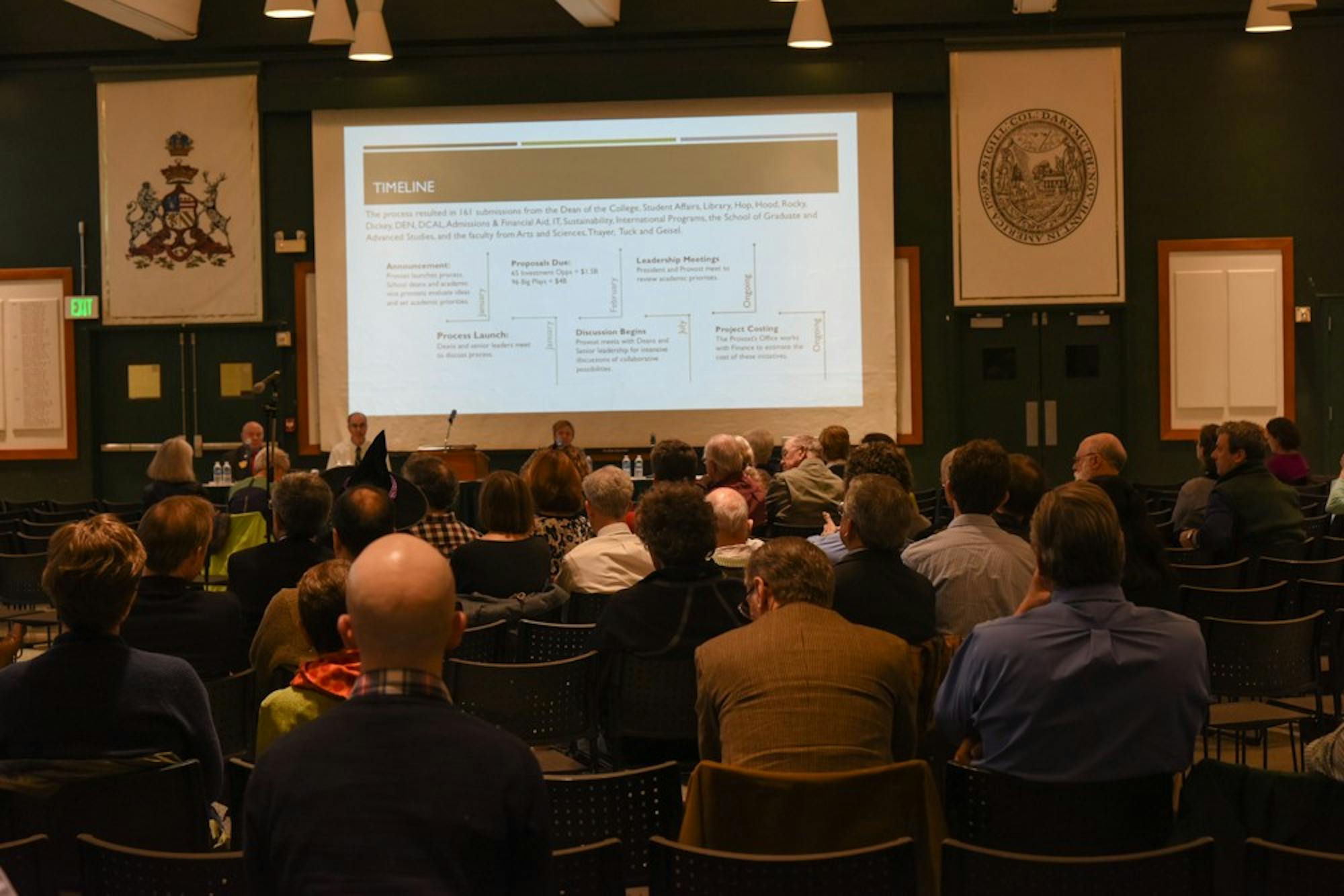The first general faculty meeting of the school year ended in confusion yesterday after it was discovered 90 minutes in that the attendance did not meet the 150-member quorum.
About 70 faculty members attended the meeting, which began with speeches from Provost Carolyn Dever and College President Phil Hanlon.
As the attendees prepared to vote on changes to the “Organization of the Faculty at Dartmouth College,” a document outlining membership and responsibilities of the various faculty committees and councils, the meeting’s third-party parliamentarian Daniel Fitzpatrick pointed out that the meeting should not have been held without quorum and a member of the credential committee should have taken attendance.
The parliamentarian asked Dever to either immediately gather more faculty members to satisfy the quorum requirement or defer the meeting.
Dever said there was no temporal urgency to vote, so she postponed the meeting to another date.
“I’ve been here for more than 30 years and I have never seen a meeting end quite like this,” French professor Kathleen Wine said after the meeting.
The faculty members were supposed to vote on Dean of Faculty Affairs Leslie Henderson’s proposal to revise the Organization of the Faculty of Dartmouth College.
Henderson requested including lecturers in the Geisel School of Medicine’s definition of faculty, indicating distinctions in voting status for different faculty groups and specifying that the one-year termination notice pertains to only non-tenured tenure-track faculty members. She also asked for the medical school to be referred to as Geisel in the document instead of Dartmouth Medical School.
Henderson cited a geographical expansion of teaching faculty, formation of new departments at Geisel and reorganization of non-clinical departments as reasons for requesting these changes.
Hanlon opened the meeting discussing the strengths of Dartmouth’s academic program as well as current institutional challenges, such as building a diverse and inclusive campus, preventing harmful student behavior and restructuring Geisel.
He noted that the College should continue providing a rigorous liberal arts education and sustaining its commitment to the teacher-scholar model that makes Dartmouth unique.
“What we need to do is two things: teach [students] how to harness the power of technology, but we also need to master things that make them uniquely human, beyond technology, such as creativity, persuasion and emotional intelligence,” Hanlon said, adding that a liberal arts education is “the right thing for graduates to thrive in where technology is becoming more advanced.”
After Hanlon’s talk, Dever highlighted the need to retain the core qualities of Dartmouth’s academic curriculum while undertaking new initiatives.
In January of 2016, the Provost’s Office developed a strategies and priorities process to solicit and fund ideas for academic initiatives from the Dartmouth community. This project resulted in 161 submissions from individual faculty members, academic departments and administrative offices, with suggestions ranging from the expansion of the First Year Student Enrichment Program to the creation of new named professorships and fellowships. Dever then met with deans and senior leaders to discuss collaborative possibilities and with the Finance and Administration Office to decide how the College should allocate its budget to fund these projects.
Over the next decade, Dever said that the Provost’s Office will invest in three core areas: faculty and research infrastructure, academic programs and residential experience.
“We are going to enhance the Dartmouth commitment to educational programs that are second to none,” Dever said, adding that several opportunities to build on the work of the Moving Dartmouth Forward Initiative and the housing communities are available.
During a question and answer session following Dever’s presentation, German studies and comparative literature professor Irene Kacandes raised concerns about the lack of investment in existing projects in the strategies and priorities process.
Computer science professor Daniel Rockmore stated that the process should be more specific with the sequencing of the initiatives.
“I think there are a lot of great principles in place, but I also believe that all the planning can’t just be done in ten years,” Rockmore said. “There are some things that we need to do tomorrow. Things move quickly.”
A specific date for the rescheduled meeting and vote was not decided on at the conclusion of yesterday’s meeting.



